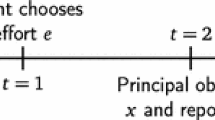Abstract
Drawing on the proposer-responder game examined by Andreoni, Harbaugh, and Vesterlund (2003), I experimentally test four variations of a principal-agent relationship with fixed pay and real effort. Depending on the treatment, the principal can voluntarily, but at her own expense, (1) only reward her agent, (2) only punish her agent, (3) either reward or punish her agent, or (4) neither reward nor punish her agent. Compared to Andreoni et al., I find substantially higher investments in reward, about the same expenses for punishment, and no significant difference among the four treatments regarding output levels. I attribute these findings to the real effort aspect of the experimental design.
Similar content being viewed by others
References
Akerlof, George A. (1982), Labor Contracts as a Partial Gift Exchange, The Quarterly Journal of Economics 97, 543–569.
Andreoni, James, William Harbaugh, and Lise Vesterlund (2003), The Carrot or the Stick: Rewards, Punishments, and Cooperation, American Economic Review 93, 893–902.
Bonner, Sarah E. and Geoffrey B. Sprinkle (2002), The Effects of Monetary Incentives on Effort and Task Performance: Theories, Evidence, and a Framework for Research, Accounting, Organizations and Society 27, 303–345.
Bonner, Sarah. E., Reid Hastie, Geoffrey B. Sprinkle, and S. Mark Young (2000), A Review of the Effects of Financial Incentives on Performance in Laboratory Tasks: Implications for Management Accounting, Journal of Management Accounting Research 12, 19–64.
Bruggen, Alexander and Martin Strobel (2007), Real Effort versus Chosen Effort in Experiments, Economics Letters 96, 232–236.
Decker, Torsten, Andreas Stiehler, and Martin Strobel (2003), A Comparison of Punishment Rules in Repeated Public Good Games. An Experimental Study, Journal of Conflict Resolution 47, 751–772.
Fehr, Ernst and Simon Gachter (2000), Cooperation and Punishment in Public Goods Experiments, American Economic Review 90, 980–994.
Fehr, Ernst and John List (2004), The Hidden Costs and Returns of Incentives — Trust and Trustworthiness Among CEOs, Journal of the European Economic Association 2, 743–771.
Fehr, Ernst and Bettina Rockenbach (2003), Detrimental Effects of Sanctions on Human Altruism, Nature 422, 137–140.
Fehr, Ernst, Georg Kirchsteiger, and Arno Riedl (1993), Does Fairness Prevent Market Clearing? An Experimental Investigation, The Quarterly Journal of Economics 108, 437–459.
Gneezy, Uri and Aldo Rustichini (2000a), Pay Enough or Don’t Pay At All, The Quarterly Journal of Economics 115, 791–810.
Gneezy, Uri and Aldo Rustichini, (2000b), A Fine is a Price, Journal of Legal Studies XXIX, 1–18.
Gurek, Ozgur, Bernd Irlenbusch, and Bettina Rockenbach (2006), The Competitive Advantage of Sanctioning Institutions, Science 312, 108–111.
Guth, Werner, Wolfgang Klose, Manfred Konigstein, and Joachim Schwalbach (1998), An Experimental Study of a Dynamic Principal-Agent Relationship, Managerial and Decision Economics 19, 327–341.
Guth, Werner, Rolf Schmittberger, and Bernd Schwarze (1982), An Experimental Analysis of Ultimatum Bargaining, Journal of Economic Behavior and Organization 3, 367–388.
Hennig-Schmidt, Heike, Bettina Rockenbach, and Abdolkarim Sadrieh (2005), In Search of Workers’ Real Effort Reciprocity — A Field and a Laboratory Experiment, Discussion Paper No. 55, Sonderforschungsbereich/Transregio 15 GESY, Universitat Mannheim.
Homans, George C. (1954), The Cash Posters, American Sociological Review XIX, 724–733.
Kirstein, Annette (2006), The Carrot and the Stick in Principal-Agent-Relationships with Real Effort, Discussion Paper No. 06–13, German Economic Association for Business Administration — GEABA, Vallendar.
Oliver, Pamela (1984), Rewards and Punishments as Selective Incentives: An Apex Game, Journal of Conflict Resolution 28, 123–148.
Podsakoff, Philip M., William D. Todor, and Richard Skov (1982), Effects of Leader Contingent and Noncontingent Reward and Punishment Behaviors on Subordinate Performance and Satisfaction, The Academy of Management Journal 25, 810–821.
Sefton, Martin, Robert Shupp, and James M. Walker (2006), The Effect of Rewards and Sanctions in Provision of Public Goods, CEAPR Working Paper No. 2006–005, Indiana University.
Shapira, Zur (1976), Expectancy Determinants of Intrinsically Motivated Behavior, Journal of Personality and Social Psychology 34, 1235–1244.
Sims, Henry P. Jr. (1980), Further Thoughts on Punishment in Organizations, The Academy of Management Review 5, 133–138.
Van Dijk, Frans, Joep H. Sonnemans, and Frans A.A.M. Van Winden (2001), Incentive Systems in a Real Effort Experiment, European Economic Review 45, 187–214.
Author information
Authors and Affiliations
Corresponding author
Additional information
I would like to thank two anonymous referees, and Roland Kirstein, Manfred Konigstein, and especially Bernd Schauenberg for their many useful comments. A part of this research was done while enjoying the hospitality of the University of California in Santa Barbara. I am also indebted to the Deutsche Forschungsgemeinschaft for providing the financial means to run the experiments.
Rights and permissions
About this article
Cite this article
Kirstein, A. Bonus and Malus in Principal-Agent Relations with Fixed Pay and Real Effort. Schmalenbach Bus Rev 60, 280–303 (2008). https://doi.org/10.1007/BF03396772
Published:
Issue Date:
DOI: https://doi.org/10.1007/BF03396772




